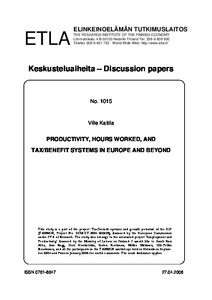Productivity, hours worked, and tax/benefit systems in Europe and beyond
"We analyse the development of labour productivity and hours worked by the working-aged population in the EU25 countries and other OECD countries in 1960-2004. We emphasise the possible effects of taxes, benefits and other labour-market variables. First, we describe the trends in productivity a...
| Main Authors: | , |
|---|---|
| Institution: | ETUI-European Trade Union Institute |
| Format: | TEXT |
| Language: | English |
| Published: |
Helsinki
2006
ETLA |
| Subjects: | |
| Online Access: | https://www.labourline.org/KENTIKA-19293973124910111559-Productivity,-hours-worked,-an.htm |
| Summary: | "We analyse the development of labour productivity and hours worked by the working-aged population in the EU25 countries and other OECD countries in 1960-2004. We emphasise the possible effects of taxes, benefits and other labour-market variables. First, we describe the trends in productivity and hours worked especially in the EU15 countries relative to the United States. Then we use both cross-section analyses of the 1995-2004 period and pooled least squares panel data analyses of the 1960-2004 period to explain the developments. Taxes and gross replacement rates do not correlate with productivity growth. Instead, productivity growth is influenced positively by investment into fixed assets, R&D and ICT, higher levels of education, and lower product market regulation. According to the results, taxes and gross replacement rates do have a negative effect on the average number of hours worked. Also the ratio between collective bargaining coverage and trade union density as well as higher product market regulation seem to have a negative effect on the number of hours worked." |
|---|---|
| Physical Description: | 34 p. Digital |

